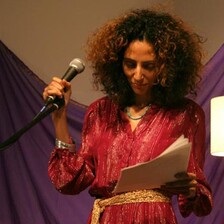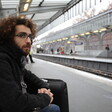The Washington Post 13 October 2002
A little more than a year ago, Suheir Hammad was just an obscure writer and occasional college student putting in work on the New York poetry circuit and taking to the streets for a variety of political causes, including standing up for former Black Panther Mumia Abu-Jamal and speaking out against the murder of Amadou Diallo.
Then terrorists attacked her city.
The 28-year-old responded the only way she knew how: She jotted down a poem, “First Writing Since.” Amid the ocean of print inspired by That Day, perhaps no other collection of words has so succinctly articulated the strange confluence of being both Muslim and American in that moment in history.
please, don’t let it be anyone
who looks like my brothers
She e-mailed it to 50 friends, and it quickly took on a life of its own. “They sent it to like, 50,000,” says the poet and playwright, speaking from her home in suburban New Jersey.
Her words were zapped to computers across the country — landing on several Web sites and in one very influential in box: That of casting scouts for HBO’s “Def Poetry Jam.”
The Brooklyn-reared Palestinian American writer was asked to read “First Writing Since” in the 2001 television premiere of the slam poetry showcase hosted by Mos Def, rapper-turned-Broadway-actor.
Tall and lean, she cut a stunning image onstage, her lush brown curls framing delicate features and brick-red lips highlighting clear, olive skin. It was the first of several dozen readings at which the young poet would bring audiences across the country to their feet.
“One thing that poetry does is signify and recognize your ancestors, the bloodlines and the land lines that you are a part of and the places you have traveled to,” the writer says now. “My parents are devout Muslims. I grew up believing the Koran was poetry … so I always felt there was power in being able to use language.”
Since that night, Hammad and eight other poets spent the summer touring the country in a live version of the television program, directed by Stan Lathan. Hammad and “Def Poetry Jam” are expected to make their Broadway debut on Nov. 7.
there are plenty
of thank yous
in ny right now… .
thank you, my attitude,
you had me fired
the week before The success of “Def Poetry Jam” is a testament to the growing popularity of the slam poetry scene, which has transformed literature into combat. Today, most American cities have at least one smoky bar where, amid swirling incense a procession of poets square off and try to win the hearts and applause of listeners. In the background you might hear the sounds of a jazz ensemble, or perhaps a deejay spinning, and invariably there is a dashiki-clad conga player. It’s stand- up meets stanzas.
Strange, really, that Hammad, who considers herself more of a traditional writer and poet, has become part of the whiz-bang world of slam poetry.
“I’m not a slam poet,” Hammad says. “I’m much more focused on the page.”
The problem with slams: When the poets get on the mike, these gatherings can — and often do — degenerate into parodies of themselves.
You can count on hearing at least one angry Mother Af-ri-caaah/Kill Whitey poem. A double triple-X-rated black erotica poem. And, of course, the My Strong Black King/Queen poem.
All of them
Are delivered in
The same rhythm and cadence.
“You see black writers out there who tell poems about how they can’t find a man,” says E. Ethelbert Miller, a noted poet and director of Howard University’s African American Resource Center.
Although Hammad is not black, Miller considers her part of “a generation of black writers who grew up without a political movement around them.”
But as a woman born in a Palestinian refugee camp in Jordan and reared in the working-class Sunset Park area of Brooklyn, Hammad brings something different to the slamfest stage: the bearing of a woman whose very existence embodies today’s most maddening international conflict.
one more person
assume they know me,
or that i represent a people.
or that a people
represent an evil
“Suheir radicalizes another body of young writers,” Miller says. “There is so much more substance in her work. I think over the last few years, even before 9/11, she was emerging as one of the best young political writers.”
Six years ago she burst on the scene in a lyrical monsoon with the memoir “Drops of This Story.”
“I wrote it in the middle of the night,” she writes in the book’s introduction, ” ‘cause I was wide awake and tired of crying.”
She says she wanted to write the book while the memories were still fresh. “It was about trying to record my story before I got too jaded and analytical of it,” she says now.
In the 92-page volume Hammad breaks down her transcontinental memories in a series of water-themed verses.
“My ears are filled with the natal juice of this tale,” she writes of her 1973 refugee camp birth. “The dates, pomegranates, figs and cactus pears that my father brought home swam in the nectar of this story. I drank it. Chewed this song lives ago. I once swallowed a fig whole, and it planted this story into my belly.”
Among Hammad’s muses, she writes in “Drops,” was an uncle who was killed by Israeli soldiers at 18. “This is the story I have to write. My uncle tells it to me in my dreams. He died in love.”
You must reach back two generations to find Hammad’s roots in Palestine — a nation that the writer’s Brooklyn public school teachers told her did not exist. Hammad’s pregnant grandmother carried her father out of their home in Lydda, a town known today as Lod. Her mother’s family was from another “1948” Palestinian town in the Ramleh district, near modern-day Tel Aviv. (The areas were conceded to Israel that year as part of the U.N. partition so they are not part of the current negotiations, Hammad explains.) After stints in Jordan and Lebanon, the family moved to Brooklyn in 1979, when Hammad was 5 years old.
This legacy joined with the reality of inner-city life in Brooklyn, where Hammad grew up the oldest of five children raised by a homemaker and a grocer. Hammad was an all-American girl, sporting Nikes, door-knocker earrings and gold chains. Using cans of colorful spray paint, she plastered her “butterphoenix” graffiti tag through hallways and along streets alive with beat-boxers, break dancers and rappers.
She wrote poems and she loved hip-hop. “It was the economy of the language, the validation and the self-affirmation,” she says. “That kind of bravado that it took to say, ‘I’m poor and I’m colored and I come from this different place.’ “
After high school, Hammad enrolled in Hunter College and immediately began writing a series of poems about her life. In 1995, she read some of that autobiographical work at a benefit for the Congo. Glenn Thompson, publisher of the independent Harlem River Press, approached her and asked if she had any material to publish. Thompson, who passed away last year, had spent time in Israel in the 1960s and had an interest in the region.
She quickly produced the manuscript for “Drops” and “Born Palestinian, Born Black,” a collection of her poetry. The books were simultaneously published in 1996.
Many in the black literary scene criticized Thompson for publishing Hammad, arguing that Harlem River Press should only, as its mission stated, publish black writers. Others in the writing community felt that Hammad, at 23, had not yet paid her dues. “People were like ‘who is she?’ ” Hammad recalls.
With great subtlety and little self-pity, Hammad answered that question in “Drops of This Story,” exploring, with great subtlety and little self-pity, the legacies of a refugee family, which included alcoholism and physical abuse. She maintained some anonymity by blurring the faces of some family members in the photographs that accompany each chapter, but today she feels it was in some ways too personal, too private.
“The lesson that’s come after 10 years, is that you think you write for yourself and your peers,” Hammad says. “But one of the great things about books is that they travel. You find you have this audience that you never had anything in common with.”
Hammad’s two books did not travel with nearly the speed her Sept. 11 poem would five years later. Although well received critically, they sputtered commercially.
She would, however, get added exposure from 1997 to 2000 writing a column for the now-defunct hip-hop magazine Stress. And this summer she made her debut as a playwright with “Blood Trinity” at this year’s NYC Hip-Hop Theater Festival.
Today “Drops” is very hard to find and the book of poetry, “Born Palestinian, Born Black,” is out of print.
When Hammad suggested the title “Born Palestinian, Born Black,” she feared it would fan the hostilities that her book contract had generated. The title was borrowed from a poem by the late June Jordan, the Brooklyn-born daughter of Jamaican immigrants who championed the Palestinian cause.
Hammad says that Thompson assuaged her concerns, adamant that the title confront “the narrow-mindedness and ignorance throughout these two communities.”
Hammad agreed. “If anything in the world inspires me, it’s that we transcend our labels,” she says. “The idea is in the title, that you don’t really become all of these things, you are born these things and you realize it through life and your life experiences. You are all these dynamic, contradictory and amazing things.”
(The writer would learn exactly how far she would transcend those labels during the frenzy over her Sept. 11 poem, when an unauthorized bio circulated on the Internet describing her — incorrectly — as half black and half Palestinian.)
Hammad continues to be spurred on by Jordan’s legacy, and uses her writing to speak out against the death penalty and police brutality. Her hope is to “inspire folks to look at the moment the poem is talking about in a new way and to use language a different way.
“To shed light [on the world] as only I and my peers have experienced it,” she says, “very specifically, in the ’80s during the growth of hip-hop in Brooklyn.”
All of her life experiences seemed to converge at once last September when she sat down to write “First Writing Since”: the schoolteachers who said her people were terrorists; the immediate concern that those responsible for the fallen towers looked like her brothers; fear for her two Brooklyn-born Muslim brothers, who happen to serve in the Navy.
archetypal arab man,
all eyelashes and nose
and beautiful color
and stubborn hair
All the people who asked her if she knew the hijackers. Her love of Palestine. Her love of Brooklyn.
On a recent Saturday night she was at Vertigo Books in College Park with a roomful of mostly Civil Rights-era writers and activists to celebrate the life of Jordan, who was lost to breast cancer in June. Midway through the six-hour session, Hammad made her way to the podium.
She stood behind the lectern, her brown curls aswirl beneath a khaki-colored knit cap. The dark circles beneath the eyes that haunt the jacket cover to “Drops of This Story” were visible beneath fluorescent lights.
Hammad began the poem “First Writing Since” by insisting that there are no words.
no poetry in the ashes
south of canal street
She spent the next eight minutes proving otherwise.
© 2002 The Washington Post Company

